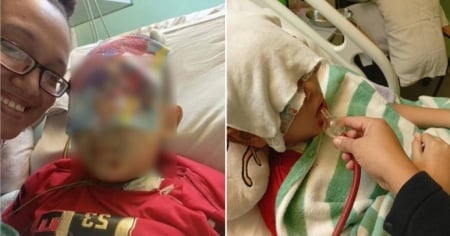The transfer of the Cuban child Geobel Damir Ortiz Ramírez, who requires urgent medical attention in the United States, remains pending due to the lack of an official hospital admission letter, an essential document for the air ambulance to make the trip.
The issuance of this letter is contingent upon the presentation of a financial guarantee that ensures the coverage of your admission to the hospital, a requirement that has not yet been met.
In a live broadcast on Facebook, Idelisa Diasniurka Salcedo Verdecia, Aylín Diaz, and Dr. Miguel Ángel Ruano Sánchez explained that, although Damir is already registered in the system of Nicholas Children's Hospital, the institution cannot accept him without a financial guarantee.
Despite having the support of an oncologist associated with the center, the hospital requires valid health insurance in the U.S. or, failing that, a backup account with at least $300,000 to cover any initial expenses while the processing of your permanent insurance is completed.
This requirement has complicated the process, as the available health insurance would only take effect next month, a timeline that is unfeasible given the child's delicate condition.
Meanwhile, alternatives have been explored to present the financial guarantee required by the hospital.
During the briefing, it was mentioned that someone had offered the backup account, although it has not yet been officially confirmed whether the proposal was accepted or if it meets the hospital's requirements.
The family and those managing the transfer have sought various avenues to achieve a swift solution, appealing to public figures and individuals with financial means who can help facilitate the necessary backup funds.
They have reiterated that this money would not be used in its entirety, but rather would serve only as a temporary guarantee until Damir is able to obtain health insurance in the U.S.
Meanwhile, the air ambulance remains ready and coordinated to transfer him as soon as this bureaucratic hurdle is resolved, something that could happen this Monday or Tuesday.
However, until the hospital issues the admission letter, the trip remains on hold.
An update on the status of the procedure is expected in the coming hours, aiming to unlock the process so that the minor can receive the urgent medical attention they need.
The health condition of Geobel Damir Ortiz Ramírez remains critical, with a diagnosis of type 1 neurofibromatosis, a plexiform neurofibroma in his right eye, and acute leukemia. According to a recent report, his condition remains severe and unstable, with constant drops in platelet and hemoglobin levels, which have necessitated emergency transfusions.
Due to the lack of options within Cuba, her mother, Eliannis Ramírez, has sought help and publicly condemned the Ministry of Public Health of Cuba (MINSAP), holding them responsible for medical negligence. In a desperate plea on social media, she demanded immediate action to save her son's life.
After an intense campaign and pressure from activists and international organizations, Damir finally received a humanitarian visa from the United States Embassy, which will enable his transfer to a hospital in Miami, where he can receive specialized treatment.
The main obstacle that remained was the funding for his transfer. In a joint effort by the Cuban community, the necessary funds were raised to cover an air ambulance that would transport him safely. Activists have emphasized the speed with which the funding was secured, thanks to donations from Cubans both inside and outside the country.
Frequently Asked Questions about the case of the Cuban child Damir Ortiz
Why has Damir Ortiz not been able to be relocated to the United States for medical treatment?
The transfer of Damir Ortiz to the United States has been delayed due to the lack of an official hospital admission letter. This document is necessary for the air ambulance to carry out the trip, and its issuance depends on the presentation of a financial backing that guarantees coverage for his hospital admission. So far, this requirement has not been met, despite the efforts of the family and activists to secure the economic guarantee requested by the hospital in Miami.
What bureaucratic problems has Damir and his family faced in Cuba?
Damir and his family have faced significant bureaucratic obstacles in Cuba, including the refusal of the Ministry of Public Health (MINSAP) to provide the necessary documentation for his humanitarian visa. This entity claimed that Cuba has the resources needed to treat the minor, which initially prevented the U.S. Embassy in Havana from approving the visa. It was only after intense efforts and public pressure that the permission for travel was finally obtained.
How has the international community responded to the case of Damir Ortiz?
The international community, including Cuban activists and individuals abroad, has responded with solidarity and support for the case of Damir Ortiz. A fundraising campaign has been organized through platforms like GoFundMe to cover the costs of the air ambulance and medical treatment in the United States. Additionally, the U.S. Embassy in Cuba made an exception and granted a humanitarian visa to the child and his mother, thus facilitating the process for the minor's transfer.
What is the current health status of Damir Ortiz?
Damir Ortiz is in a delicate health situation, diagnosed with neurofibromatosis type 1, a plexiform neurofibroma in his right eye, and acute leukemia. His condition has worsened in recent months, making it urgent for him to be transferred to the United States for specialized treatment that is not available in Cuba. The family and activists continue to work to overcome bureaucratic hurdles and achieve his transfer as soon as possible.
Filed under:
